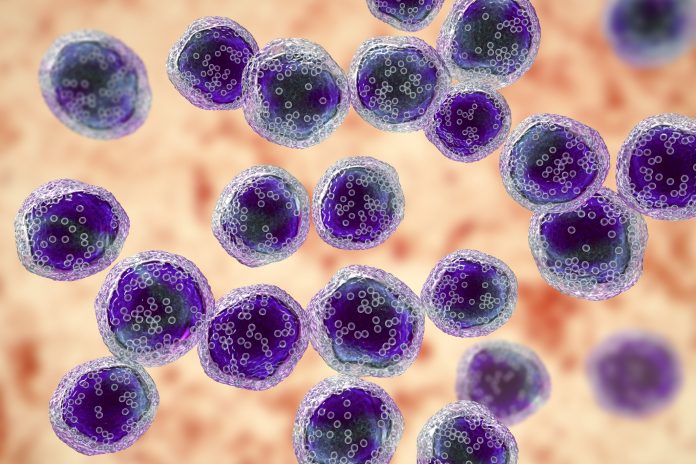
AbbVie and Genmab have announced topline results from the first cohort of the EPCORE phase 1/2 clinical trial of epcoritamab (DuoBody-CD3xCD20), an investigational subcutaneous bispecific antibody they are co-developing. The study cohort includes 157 patients with relapsed/refractory large B-cell lymphoma (LBCL) who received at least two prior lines of systemic therapy. Of these, 38.9 percent received prior treatment with chimeric antigen receptor (CAR) T-cell therapy. Based on an encouraging overall response rate of more than 60%, the companies say they will “engage global regulatory authorities.”
“We aim to leverage AbbVie’s strong blood cancer expertise to further develop epcoritamab, alongside Genmab, for certain blood cancer patients who have limited treatment options,” said Mohamed Zaki, vice president and head, global oncology development, AbbVie.
LBCL is a fast-growing type of non-Hodgkin’s lymphoma (NHL)—a cancer that develops in the lymphatic system and affects B-cell lymphocytes. There are an estimated 150,000 new LBCL cases each year globally. LBCL includes diffuse large B-cell lymphoma (DLBCL), which is the most common type of NHL worldwide and accounts for approximately 31 percent of all NHL cases.
Epcoritamab is an investigational IgG1-bispecific antibody created using Genmab’s proprietary DuoBody-CD3 technology, which is designed to direct cytotoxic T cells selectively to tumors to elicit an immune response towards malignant cells. Epcoritamab binds simultaneously, to CD3 on T cells and CD20 on B-cells and induces T cell mediated killing of lymphoma B cells. CD20 is a well validated therapeutic target, and is expressed on many B-cell malignancies, including diffuse large B-cell lymphoma, follicular lymphoma, mantle cell lymphoma, and chronic lymphocytic leukemia.
EPCORE NHL-1 an open-label, multi-center safety and preliminary efficacy trial of epcoritamab that consists of two parts: a phase I first-in-human, dose escalation part; and a phase II expansion part. The trial was designed to evaluate subcutaneous epcoritamab in patients with relapsed, progressive or refractory CD20+ mature B-NHL, including LBCL and DLBCL. The dose escalation findings, which determined the recommended phase II dose, were published in The Lancet in 2021. In the phase II expansion part, additional patients are treated with epcoritamab to further explore the safety and efficacy of the drug in three cohorts of patients with different types of relapsed/refractory B-NHLs who had limited therapeutic options.
This trial had a confirmed overall response rate (ORR) of 63.1 percent. The observed median duration of response (DOR) was 12 months. The mean lines of prior therapy in this cohort were 3.5 (2 to 11 lines of therapy). The most common treatment-emergent adverse events of any grade (greater than or equal to 20 percent) included cytokine release syndrome (CRS) (49.7 percent), pyrexia (23.6 percent), fatigue (22.9 percent), neutropenia (21.7 percent), and diarrhea (20.4 percent). The most common Grade 3 or 4 treatment-emergent adverse events (greater than or equal to 5 percent) included neutropenia (14.6 percent), anemia (10.2 percent), neutrophil count decreased (6.4 percent), and thrombocytopenia (5.7 percent). Additionally, the observed Grade 3 CRS was 2.5 percent.
Epcoritamab is being co-developed by AbbVie and Genmab as part of the companies’ broad oncology collaboration. They are evaluating epcoritamab as a monotherapy, and in combination, across lines of therapy for a variety of hematologic malignancies, including an ongoing phase 3, open-label, randomized trial evaluating the drug as a monotherapy in patients with relapsed/refractory DLBCL (NCT: 04628494).
“Together with our partner, AbbVie, we will work with regulatory authorities to determine next steps and continue to evaluate epcoritamab in a variety of clinical trials as a potential treatment option for patients with various hematological malignancies,” said Jan van de Winkel, chief executive officer, Genmab. “We look forward to sharing the findings at a future medical meeting.”













